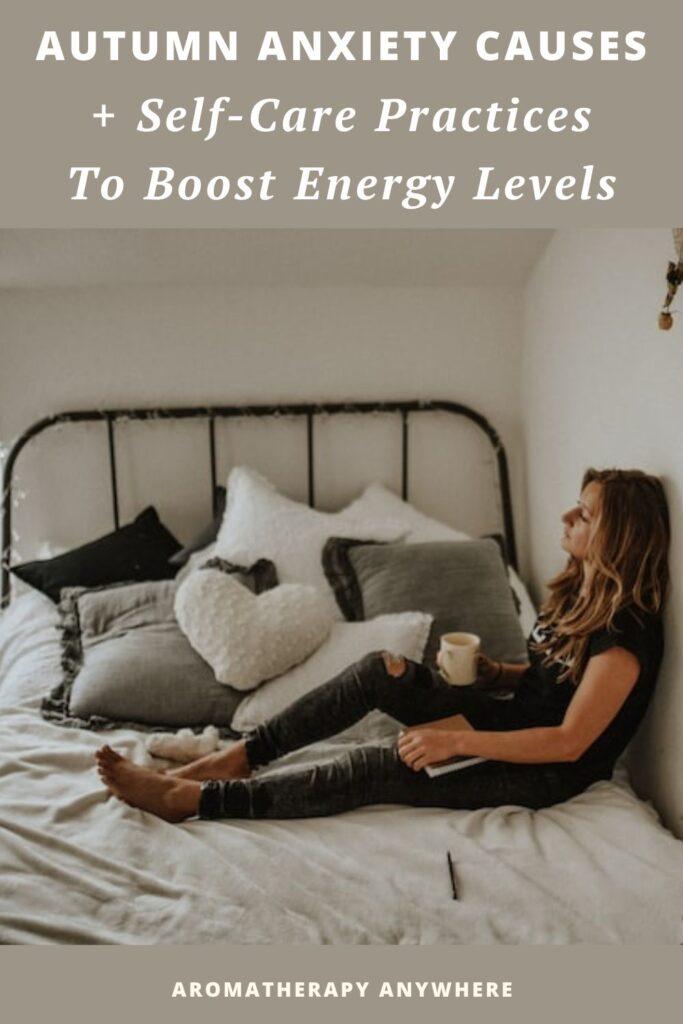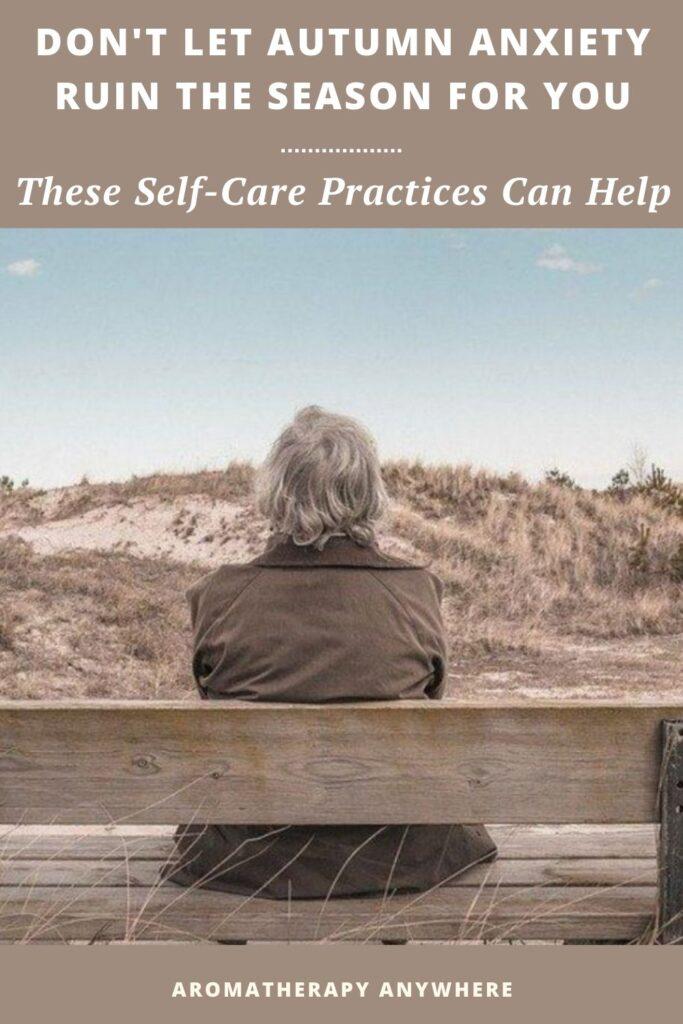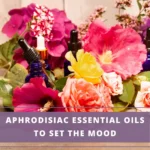As an Amazon Associate I earn from qualifying purchases. See Full Disclosure Here
An increase in stress and anxiety levels accompanied by a persistent feeling of fatigue and low mood are classic symptoms of autumn anxiety. These symptoms are associated with the change in weather.
Here’s what you should know about autumn anxiety and what you can do to manage the symptoms.
 What is Autumn Anxiety?
What is Autumn Anxiety?
General anxiety can happen at any time of the year and may be caused by several different factors.
Autumn anxiety is a specific type of anxiety that starts with the onset of fall and often gets more severe as the days get shorter. The term was coined by a Welsh doctor who observed an increase in patients experiencing anxiety with the onset of autumn.
Autumn anxiety is closely linked to seasonal affective disorder (SAD), however, it is not an officially diagnosable condition like SAD or clinical depression. With autumn anxiety, the symptoms are more about anxiety and less about depression.
What Causes Autumn Anxiety?
There is no single factor that causes seasonal anxiety. Instead, there are a number of contributing factors.
Experts say it’s more likely due to the shorter days and shorter sunlight hours. The lower sunlight exposure affects the circadian rhythm, the body’s internal biological clock that regulates hormone production and brain wave activity. This is the main cause of autumn anxiety.
There could be other contributing factors too. The sudden change in routine from summer to fall can feel drastic. One day you’re enjoying the outdoors and the sunshine and suddenly it’s dark and gloomy and you’re stuck indoors most days.
Another factor is that it signals that yet another year is coming to an end. It can trigger feelings of regret from not having achieved desired goals over the year gone by.
Although there are no defined reasons for anxiety during fall, there are a few ways to reduce the symptoms and enjoy the season.
Common Symptoms Of Autumn Anxiety
The exact symptoms and the intensity of symptoms varies from one person to another.
It helps to recognize the signs that may suggest you’re experiencing seasonal anxiety. The earlier you recognize the symptoms, the sooner you can take steps to manage it or lower the intensity of the symptoms.
Autumn anxiety generally manifests as a combination of physical and emotional changes. These may come on suddenly or they may appear gradually starting towards the end of summer and the beginning of fall.
These are some of the symptoms to look out for:
- Feeling lethargic and listless
- Losing interest in your favorite activities
- Struggling to stay focused and concentrate
- Becoming moody and irritable for no reason at all
- Having an overwhelming sense of dread
- Either sleeping too much or too little
- Loss of appetite
- Restlessness
- Feeling agitated for no apparent reason
Because the symptoms are so wide-ranging it can be difficult to recognize them for what they are. Many people think they are just imagining the symptoms and ignore them. This doesn’t help.
The symptoms of autumn anxiety don’t disappear when you ignore them. They just keep building up and getting worse as the days get shorter and darker.
Autumn anxiety is made worse when family members also dismiss your feelings and tell you to ‘get some rest and you’ll be okay’. Unfortunately, it doesn’t work that way and you won’t feel okay unless you proactively do something about it.
If you recognize that this is something that happens to you every year, being proactive is the best way to head off the anxiety at the start.
12 Things You Can Do to Manage Your Fall Anxiety
1. Get More Sunlight
 If lack of exposure to the sun is the main cause of autumn anxiety, it stands to reason that getting more sunlight will help reduce the symptoms.
If lack of exposure to the sun is the main cause of autumn anxiety, it stands to reason that getting more sunlight will help reduce the symptoms.
Increasing exposure to sunlight is the single most effective thing you can do to manage the symptoms of fall anxiety. 9 Health Benefits of Sunlight.
The days may be shorter but the sun still shines for at least a few hours every day. Take full advantage of these hours of sunshine.
No matter how hectic your day ahead looks like, schedule in your sunshine time, even if it is just for a few minutes every day. Do this starting in early fall. Ignoring it now will only make it worse as the season progresses and the days get darker and colder.
Sunshine or not, spending time in nature can be refreshing at any time of the year. In fall, you get to enjoy nature in all its glory.
As you step out every day, you’ll get a close-up view of nature changing its colors from green to bright oranges and warm reds. It’s an amazing experience that’s uplifting and refreshing.
2. Use Light Therapy to Get Your Daily Dose of Light
If you live in a cold climate with mostly rainy days during fall, light therapy can help.
Light therapy involves using an alternate source of light to make up for the lack of sunshine.
Exposure to regular household bulbs doesn’t work. What you need is exposure to a Light Therapy Lamp.
Light therapy lamps are also known as phototherapy boxes or light lamps. These are special types of lamps that emit light at the same intensity as natural outdoor light.
Exposure to this light increases serotonin production and regulates the circadian rhythm. This helps lift your mood and lower symptoms of autumn anxiety.
This guide highlights the Benefits and Uses of Light Therapy
If you’ve never used a light therapy lamp, this may help – Best Light Therapy Lamps For SAD
3. Create Calm with a Hygge Practice
 Hygge is an interesting Danish tradition that encourages you to create a cozy, comfortable environment in your home on cold fall days.
Hygge is an interesting Danish tradition that encourages you to create a cozy, comfortable environment in your home on cold fall days.
It involves indulging in activities that may you feel warm and cozy, no matter how drab, dark, and grey the season.
Use these Hygge Activity Ideas for that Cozy Fall Feeling.
4. Keep a Journal
Why journal for anxiety? The act of writing in a journal can be very therapeutic and can do wonders for lowering your anxiety levels.
For a start, it helps get those anxious thoughts and fears out of your head. Our anxiety tends to get worse when we focus too much on what we are afraid of.
The act of putting pen to paper and writing down what you’re worried about gives words to your fears and anxiety. This gets it out of your head and can also make it seem much less bad than we think.
Journaling is also good for finding clarity when your anxiety is from specific situations that have been frustrating you. Writing about it can help you get the clarity you need.
Focusing on journaling also works to distract your mind when you are going through a panic attack or having a particularly bad anxiety day.
5. Use Aromatherapy To Alleviate Anxiety
Aromatherapy is very effective in alleviating anxiety and promoting a sense of tranquility and calm.
The best scents for fall are warm and comforting – think nutmeg, clove, cardamom, eucalyptus, and sweet orange. You can mix these basic fall essential oils in different combinations to create a variety of fabulous fall scents to add to your diffuser.
Fabulous Fall Essential Oils & Blends and How to Use Them.
6. Start a New Fall Morning Routine
 Fall is all about getting warm, cozy, and comfortable and being grateful for everything in your life. It is also a great time to adjust your morning routine.
Fall is all about getting warm, cozy, and comfortable and being grateful for everything in your life. It is also a great time to adjust your morning routine.
This fall morning routine keeps the season in mind. It’s sure to improve your physical and mental health and set you up for more focused and productive days.
It’s important to keep self-care foremost in your mind not just in the morning but all day long. These 25 Fall Self-Care Ideas will help you enjoy the season.
7. Practice Breathing Exercises
 Breathing exercises are often recommended for different forms of anxiety and can help with fall anxiety as well.
Breathing exercises are often recommended for different forms of anxiety and can help with fall anxiety as well.
When you recognize your anxiety getting worse, find a quiet place where you can sit in peace and quiet for at least a few minutes.
There are different types of breathing exercises that you can perform. The easiest is to inhale through your nose while slowly counting to five, then exhale through your nose again counting to five.
There is a whole science behind what happens when you breathe slowly while focusing on each breath. In short, focusing on your breathing while counting can be very calming.
Some people prefer to use visualization instead of counting during breathing exercises. That works too. Experiment to see which method works best for you.
8. Recognize Irrational Thoughts
Irrational thoughts are ones that are based more on your fears and worries, and less on what could (or has) actually happened.
Almost everyone has these types of thoughts now and then but they are fleeting. If these irrational fears disrupt your ability to carry on with your everyday tasks, you need to do something about them.
The best way to keep irrational thoughts at bay is by writing down what you’re anxious about. As you write down your negative thoughts and fears, it will help you realize that maybe they are not as scary as you imagined them to be.
9. Express Gratitude Every Day
Expressing gratitude helps you stay focused on what you have. It’s an effective way to distract yourself from your fears and anxiety and think of the positives instead.
Maintaining a daily gratitude practice is easy and won’t take more than a few minutes. All you need to do is think of three things you’re grateful for and write these down. You can do this as part of your daily journaling or as a separate activity any time of the day.
You can use a gratitude journal or any notebook to write down the things you’re grateful for. On days when you’re feeling particularly low, going through your daily gratitude notes can help lift your spirits. You’ll realize things are not as bad as they appear and you do have a lot of good things going on in your life.
10. Make a Fall Bucket List
 Making a fall bucket list helps you focus on something to look forward to.
Making a fall bucket list helps you focus on something to look forward to.
Create a list of upcoming events with dates and schedule some exciting activities at least once a week.
For example, fall festivals and fairs often include activities such as corn mazes, hay rides, or even hot air balloon rides. These can be a fun way to get outside and enjoy the season with family and friends instead of staying indoors.
Some ideas to kick things off;
Go apple picking
Head to a pumpkin patch
Look for local festivals and fairs
Maybe start planning your Thanksgiving or Christmas dinner early. It will give you something to look forward to and also eliminate the stress that typically comes from last-minute planning.
11. Host an Essential Oil Make & Take Party
Fall is the perfect time to host an essential oil make-and-take party. It allows you to combine several fun activities into one and is a great way to socialize with other essential oil enthusiasts. Beats staying indoors alone and feeling weighed down by the season.
When you host an essential oil make and take party you get to exchange ideas for things to make with essential oils. You and your guests can make all sorts of homemade gifts to give friends and loved ones for Thanksgiving, Hanukkah, and Christmas.
Use these ideas to organize an Essential Oil Make & Take Party.
12. Add Healthy Habits to Your Daily Routine
Incorporating healthy habits into your daily routine can be very effective for lowering anxiety. Don’t make too many changes at once. If you can’t commit to it and give up halfway, you’ll only end up feeling defeated.
Think small steps. Here are some easy things you can do:
Gentle exercise each day. Exercise doesn’t have to feel like punishment! It is great for your heart health, muscles, and yes, your mental health. Release those endorphins and reduce anxiety just by adding a small amount of exercise to your day.
Find Exercises You Love. Don’t feel coerced into weight lifting or running on the treadmill if you don’t want to. Remember, you’re trying to alleviate your anxiety, not add to it. Dancing, hiking, doing gentle yoga stretches or a walk at the park can be both enjoyable and energizing.
Cut back on caffeine consumption. Caffeine is a stimulant and can make your anxiety worse, and even lead to panic attacks. If you struggle with anxiety, try to reduce your caffeine intake and switch over to herbal tea instead. A cup of herbal tea can be warm and comforting without the anxiety-inducing caffeine. Check out these delicious teas for any time of the year.
Watch your diet. A poor diet with junk food can exacerbate your anxiety. Hearty soups and stews flavored with herbs are a healthier alternative and they are more satisfying too.
Don’t hesitate to talk to your doctor if these and other treatments aren’t helping.
Use These Activities To Embrace Fall, Instead of Dreading it
To embrace fall, add in some activities each day that remind you of the things you LOVE about the season. This might mean some spiced chai tea in the morning, going apple picking over the weekend, spending time in the sun, or writing in a fall-themed journal every day.
Related Reads:
Fight Fall Fatigue & Boost Energy Levels Naturally
Understanding & Managing Seasonal Affective Disorder
Self Care For SAD – Seasonal Affective Disorder
Keep Moving – Exercise Your Way Out Of Seasonal Affective Disorder
Light Therapy For SAD – Using The Power Of Light To Beat The Winter Blues

Disclaimer: This information is not intended to serve as medical advice. Please consult your doctor before using any natural medication or if you experience any unusual symptoms. See Full Disclaimer here.









